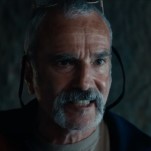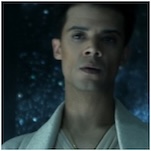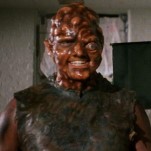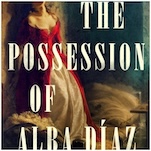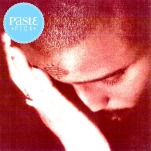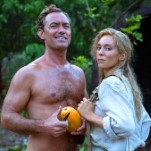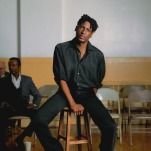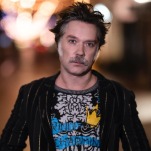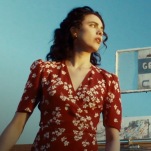Eric Powell on The Green Bay Packers, Creator-Owned Hubris and the End of The Goon
For sheer pulp exhilaration, depression-era strongman The Goon represents an undeniable high point in comics. Created by writer/artist Eric Powell in 1998, the long-running series follows the titular Goon and his sidekick, Franky, as they duke it out with all manner of the occult, including an unsavory figure known as the Zombie Priest. The Goon may abound with irreverent humor, but it can also dive into bleak austerity, matching the grizzled mood of its main character. Powell’s stylized, nuanced art captures this dynamic as well (embodied perfectly in the emotional “Chinatown and the Mystery of Mr. Wicker” sequence that follows The Goon’s expression as it slides into despair while staring in a mirror. It’s quietly stunning).
The latest story arc, “Once Upon a Hard Time,” debuts tomorrow, and possibly ends the series. In a recent Reddit AMA, Powell noted that, “it may be the last story entitled The Goon I ever do.” With this bittersweet announcement and the news of deluxe hardcover editions releasing later this year, Paste caught up with Powell over the phone, discussing everything from his favorite football team to the current state of creator-owned comics.
![]()
Paste: The Goon moves from moments of comedy to some very dark emotional spaces. How do you work out the balance between irreverent moments and wrenching scenes?
Eric Powell: I kind of just go by instinct. I don’t work out a plan where I have to have seven pages here, and then I have to have a comedy beat in order for this to work. I really write scripts and work from a gut instinct. If it works for me when I’m reading it, hopefully it’ll work for the reader, too. It’s not a technical process. I don’t agree with formulaic writing. There’s a lot of books out there, especially with screenwriting, that tell you, “Oh, in the first five pages, you have to have this, and you have to have an action beat here,” or whatever. I don’t agree with that. I think it becomes predictable and kind of boring. I’ve never really written comics that way. I go off of feel, and try to keep it exciting and entertaining for myself. If it doesn’t seem too out of place, I just kind of run with it.
Paste: In terms of the larger mythology of the series, you have elements from folktales and gangster pictures, all in the same world. Is there a similar instinctual thing going on there?
Powell: With The Goon, I’ve taken everything that I love and thrown it into a blender, and that’s kind of what came out. A lot of the stuff just comes from the type of material that I like to draw, really playing to my strengths, to a point. I really love the Depression-era ‘30s and ‘40s kind of look — cars and dress and everything like that. We never really say exactly when or where the story is taking place. Obviously, it’s set in some weird version of that type of time period. I tried to come up with something where I could do anything I wanted. I think I came pretty close with The Goon.
Paste: It’s a small thing, but I love whenever the old-looking football uniforms make an appearance.
Powell: I’m a big Green Bay Packers fan. I’m from Nashville; I’m not from Wisconsin. One of the reasons that I became a fan, though, is because I just love the history of the game. You can’t get much more historic than the Packers being there from the beginning. The uniforms in that football story definitely came from the ‘20s and ‘30s look: the striped sleeves and the sweaters and everything.
Paste: How did you end up becoming a Packers fan?
Powell: I liked the fact that the town owned them. You have this tiny little town — Green Bay, Wisconsin — and they have a pro football organization. I made a trip to the holy land kind of thing, where I went and saw a game there for the first time, and it amazed me. I grew up in a little area between Mount Juliet and Lebanon, Tennessee, these tiny little towns. It was as if you took my hometown and put a professional football stadium there. It’s this little neighborhood there, and you turn around, and there’s Lambeau Field, this giant stadium. I love that. I love that about them. I love that you don’t have some millionaire, billionaire owner, and it’s not a major city. It’s this tiny little town, and all they have are the Packers, and everyone there loves them. For me, I can’t not be a fan of that team. That’s my team. I don’t care if I’m from Nashville — that’s my team.
Paste: When did you decide to do the hardcover library editions?
Powell: A lot of other books were getting library editions, and we held off, because we were at that weird midpoint. We had a lot of collections out there, but did we want to put out hardcover editions? It was one or the other; we could either have the softcover trade paperbacks, or we could switch over to the library editions. How would that affect sales of one or the other? We were up to the 12th collection, and were wondering when would be the right point to pull the trigger on it. I think we all just got to the point where we said, “Yeah, now’s a good time.” We were going to have enough out there that we should go ahead and collect them and put out some nicer editions. We had a lot of fan requests to put these things out in a nice, shelf-worthy presentation.
-

-

-

-

-

-

-

-

-

-

-

-

-

-

-

-

-

-

-

-

-

-

-

-

-

-

-

-

-

-

-

-

-

-

-

-

-

-

-

-






















